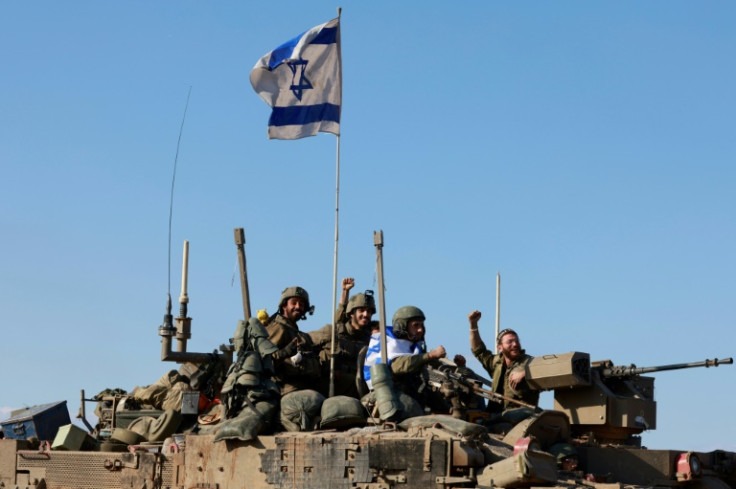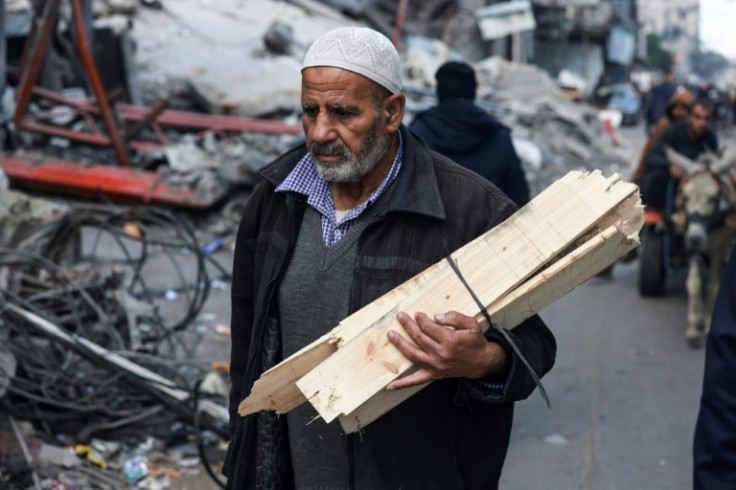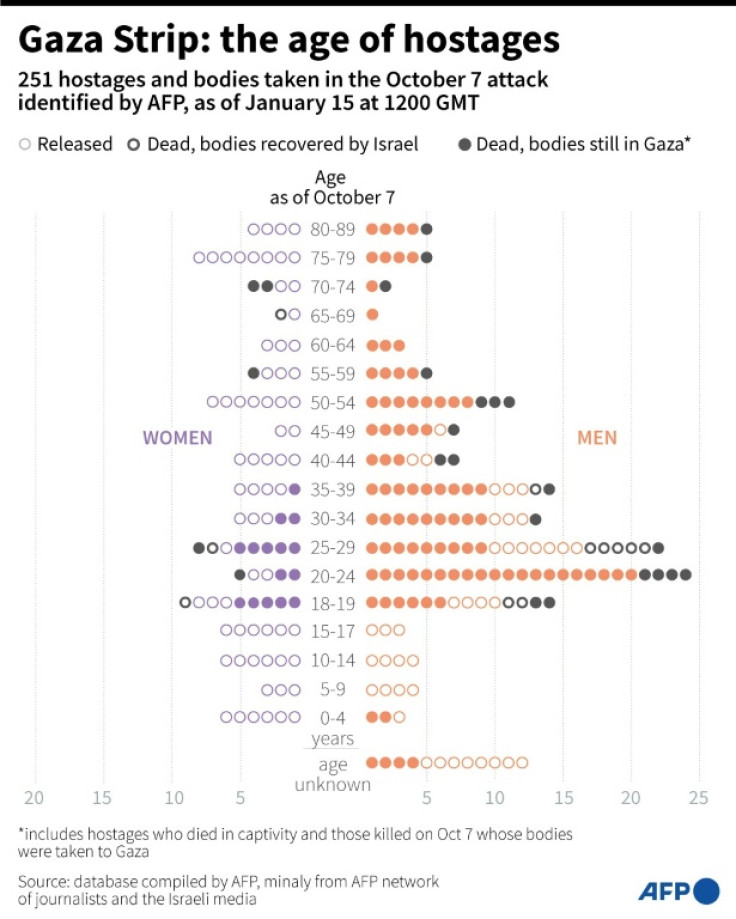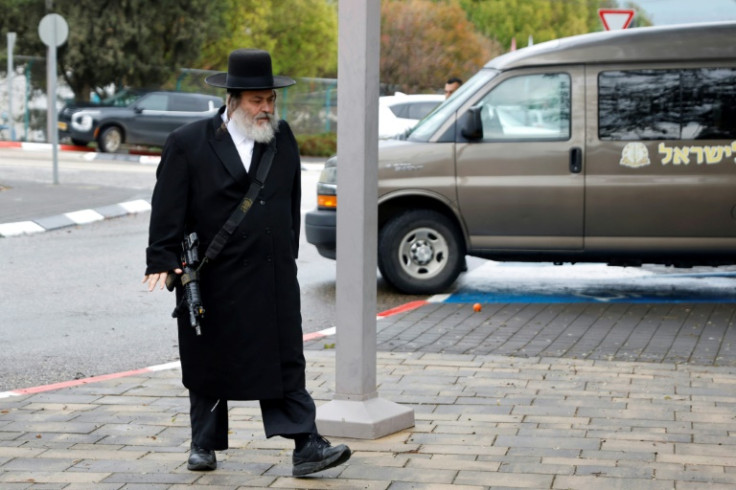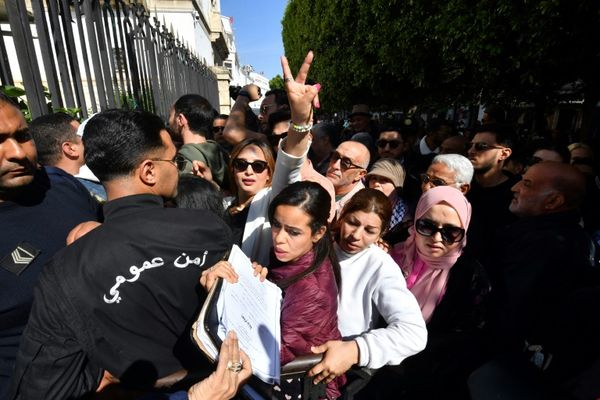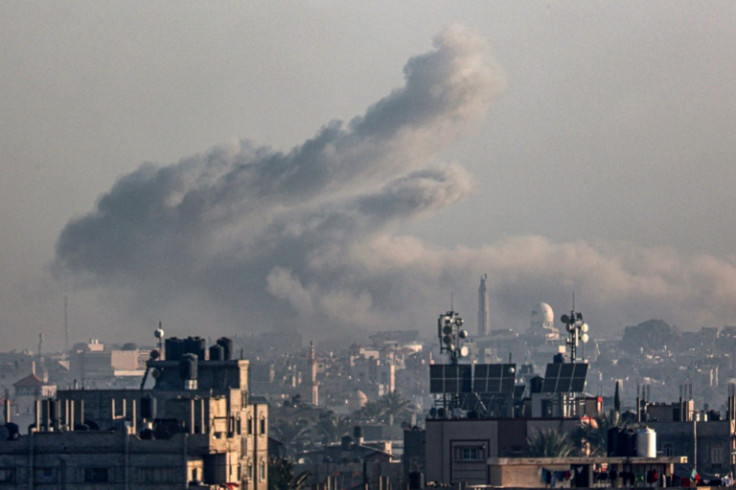
Israel pummelled southern Gaza on Tuesday, killing dozens, even as authorities announced the winding down of the intense phase of the war that has inflamed tensions across the Middle East.
The government of Israeli Prime Minister Benjamin Netanyahu has come under mounting international pressure to end its offensive in Gaza launched in response to Hamas's unprecedented October 7 attacks.
But fears are mounting the war could be widening, with Iran and its proxies stepping up attacks across the region in solidarity with Hamas, the Islamist movement that rules the Palestinian territory.
Overnight, a wave of Israeli strikes killed at least 78 people in the Gaza Strip, Hamas's press office said. An AFP correspondent said the southern city of Khan Yunis was hit hard.
On Tuesday morning, a barrage of 50 rockets was fired at southern Israel, near Netivot, without causing any casualties, the Israeli army said.
Fighting has ravaged Gaza since October 7, when Hamas militants carried out an unparalleled attack on Israel that resulted in about 1,140 deaths, mostly civilians, according to an AFP tally based on official Israeli figures.
Militants also seized about 250 hostages and dragged them back to Gaza, 132 of whom Israel says are still in the coastal territory, including at least 25 believed to have been killed.
More than 24,000 Palestinians, around 70 percent of them women, young children and adolescents, have been killed in Gaza in Israeli bombardments and ground operations since October 7, according to the Hamas government's health ministry.
AFPTV live footage showed trails of smoke and explosions ring out as Israel's air defences intercepted rockets near the Gaza border.
Khan Yunis has been the focus of Israeli military operations since the army said on January 6 that it had dismantled Hamas's military structures in the north and was shifting its focus to the south.
Israeli Defence Minister Yoav Gallant had told a news conference on Monday that intense operations would soon be winding down in south Gaza.
"In southern Gaza we will reach this achievement and it will end soon, and in both places, the moment will come when we will move to the next phase," he said, without specifying a time frame.
The health ministry said on Tuesday that the war had claimed the lives of at least 24,285 people in the Palestinian territory.
UN Secretary-General Antonio Guterres on Monday reiterated calls for a stop to the fighting.
"We need an immediate humanitarian ceasefire to ensure sufficient aid gets to where it is needed, to facilitate the release of the hostages, to tamp down the flames of wider war -- because the longer the conflict in Gaza continues, the greater the risk of escalation and miscalculation," he said.
Israeli officials, including Netanyahu over the weekend, have repeatedly warned the fighting in Gaza will go on for months.
Violence involving regional allies of Iran-backed Hamas -- considered a terrorist group by the United States and the European Union -- has surged since the war began.
Yemen's Huthi rebels, who say they act in solidarity with Gaza, claimed a missile strike on a US-owned cargo ship on Monday, just days after the United States and Britain bombed scores of targets inside the country in response to repeated attacks on shipping in the Red Sea.
Overnight, Iran's Islamic Revolutionary Guard Corps said it carried out a missile attack that destroyed "the Zionist regime's (Israel) spy headquarters in the Kurdistan region of Iraq.
The IRGC said it also struck a "gathering of anti-Iranian terrorist groups" in Arbil, the capital of Iraqi Kurdistan, and hit a number of Islamic State group targets in Syria.
Iraq condemned the strikes as "attack on its sovereignty" and said authorities "will take all legal steps", including "lodging a complaint with the (UN) Security Council", the foreign ministry said.
It also summoned Iran's envoy in Baghdad and recalled its ambassador from Tehran for consultations. Iran defended the strikes, saying they were a "targeted operation" and "just punishment" against those who breach the Islamic republic's security.
The United Nations says the Israel-Hamas war has displaced roughly 85 percent of Gaza's 2.4 million population, many of whom have been forced to crowd into shelters and struggle to get food, water, fuel and medical care.
As temperatures plunge, families living in makeshift tents in Rafah have resorted to burning plastic to ward off the chill, despite the noxious fumes.
"At night, I feel like we're going to die from the cold," said Haneen Adwan, 31, a mother of six who was forced to flee from central Gaza's Nuseirat refugee camp.
The Israeli public, meanwhile, has kept up intense pressure on the government to secure the return of the hostages seized by Hamas on October 7, with the militant group on Monday announcing the deaths of two more captives.
Hamas's armed wing released a video showing a woman hostage, speaking under duress, revealing that two men she was held with had been killed in captivity.
Israeli army spokesman Daniel Hagari rejected the cause of death as a "lie", but added: "We know that we hit targets near the location where they were held", saying an investigation was under way.
Hagit Chen, the mother of one of the hostages, said at an event in Berlin that it was "hard to live, to sleep, to breathe, to eat" because she had heard nothing from her son Itay, 19, since Hamas took him captive.
